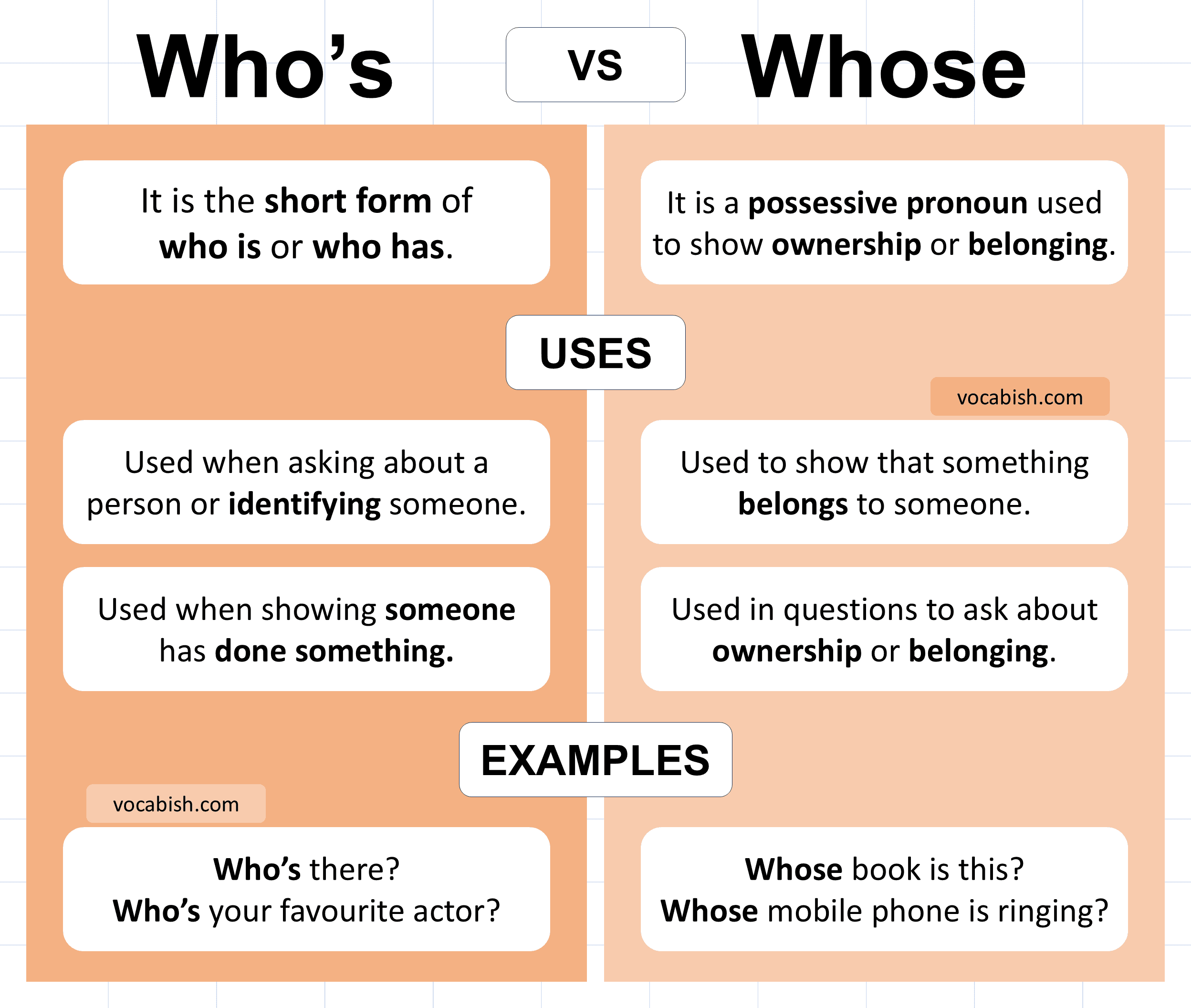Many English learners confuse who’s and whose because they sound exactly the same — but their meanings and uses are completely different. This guide will help you understand the difference easily with examples and simple explanations.
Meanings of Who’s and Whose
Who’s
It is the short form (contraction) of who is or who has.
Example:
- Who’s coming to the party? (= Who is coming?)
- Who’s finished their work? (= Who has finished?)
Whose
It is a possessive pronoun used to show ownership or belonging.
Example:
- Whose book is this? (= To whom does this book belong?)
- That’s the boy whose father is a doctor.
Differences Between Who’s and Whose
| Feature | Who’s | Whose |
|---|---|---|
| Type | Contraction | Possessive Pronoun |
| Full Form | Who is / Who has | Belongs to whom |
| Use | Shows identity or action | Shows possession or belonging |
| Example | Who’s at the door? (Who is) | Whose bag is this? (Belongs to whom) |
| Sound | Same pronunciation | Same pronunciation |
| Meaning | Verb-based | Ownership-based |
- If you can replace it with “who is” or “who has,” use who’s.
- If it shows possession or belonging, use whose.
Usage of Who’s
Contraction for “Who is”
Used when asking about a person or identifying someone.
- Who’s there? (Who is there?)
- Who’s your favourite actor? (Who is your favourite actor?)
- Who’s at the door? (Who is at the door?)
Contraction for “Who has”
Used when showing someone has done something.
- Who’s been to London before? (Who has been…)
- Who’s finished their homework? (Who has finished…)
- Who’s taken my pen? (Who has taken…)
Informal Contexts
Who’s is often used in spoken English and informal writing because it sounds natural and conversational.
- Who’s ready for lunch?
- Who’s coming with me?
Usage of Whose
Indicates Possession
Used to show that something belongs to someone.
- Whose shoes are these?
- I met a girl whose brother is a pilot.
- Whose mobile phone is ringing?
Ownership Inquiry
Commonly used in questions to ask about ownership or belonging.
- Whose car is parked outside?
- Whose idea was this?
- Do you know whose pencil this is?
Formal and Informal Usage
- In formal writing, whose is used to show possession in relative clauses.
Example: The student whose project won the prize is very talented. - In informal speech, it’s often used in direct questions.
Example: Whose turn is it to clean the room?
Summary on Who’s vs Whose
- Who’s = Who is / Who has
Example: Who’s coming to dinner?
Example: Who’s done the homework? - Whose = Belongs to whom / Shows possession
Example: Whose book is on the table?
Example: That’s the man whose car broke down.
Easy Rule to Remember:
- If you can replace the word with who is or who has, use who’s.
- If you can replace it with his / her / their, use whose.
FAQs on Who’s vs Whose
What is the difference between who’s and whose?
Who’s is short for who is or who has, while whose shows possession or ownership.
Can I use who’s in formal writing?
You can, but in formal writing, it’s better to use the full forms — who is or who has.
Is whose a contraction?
No, whose is not a contraction. It’s a possessive pronoun.
How can I easily remember the difference?
If the sentence makes sense with “who is,” use who’s.
If the sentence talks about ownership, use whose.
Can I say “who’s car is this”?
❌ No. That’s incorrect.
✅ Correct: Whose car is this? (It shows ownership.)
Read More

